Assessing Project Management Skills in Civil Engineering Projects
VerifiedAdded on 2021/06/14
|15
|3642
|45
Report
AI Summary
This report provides a comprehensive analysis of project management skills within the context of civil engineering, drawing upon various research papers and studies. It explores the critical skills required for project managers, including communication, organizational, and budgeting skills, and their impact on project performance. The report examines the importance of leadership competence, risk management, and the application of tools like fuzzy AHP in decision-making. It delves into factors influencing project success, such as customer satisfaction, team competency, and the effectiveness of project management practices. The research also investigates managerial drivers of labor loyalty, the role of leadership, and the importance of continuous professional development for project managers. Overall, the report highlights key aspects of project management in civil engineering, offering insights into enhancing project delivery, improving efficiency, and achieving desired project outcomes. The report is a compilation of various research papers and case studies to present a cohesive understanding of project management in civil engineering.
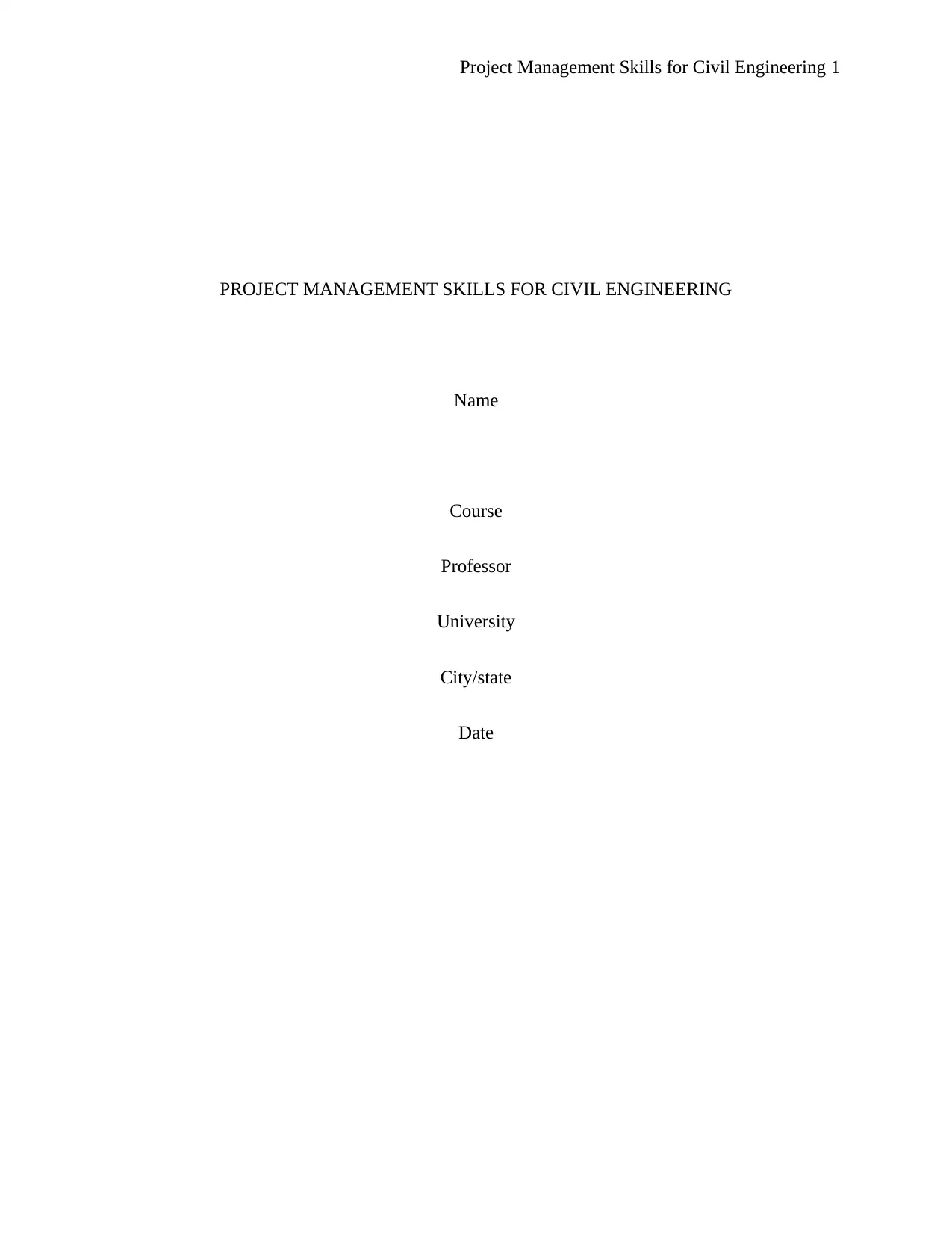
Project Management Skills for Civil Engineering 1
PROJECT MANAGEMENT SKILLS FOR CIVIL ENGINEERING
Name
Course
Professor
University
City/state
Date
PROJECT MANAGEMENT SKILLS FOR CIVIL ENGINEERING
Name
Course
Professor
University
City/state
Date
Paraphrase This Document
Need a fresh take? Get an instant paraphrase of this document with our AI Paraphraser
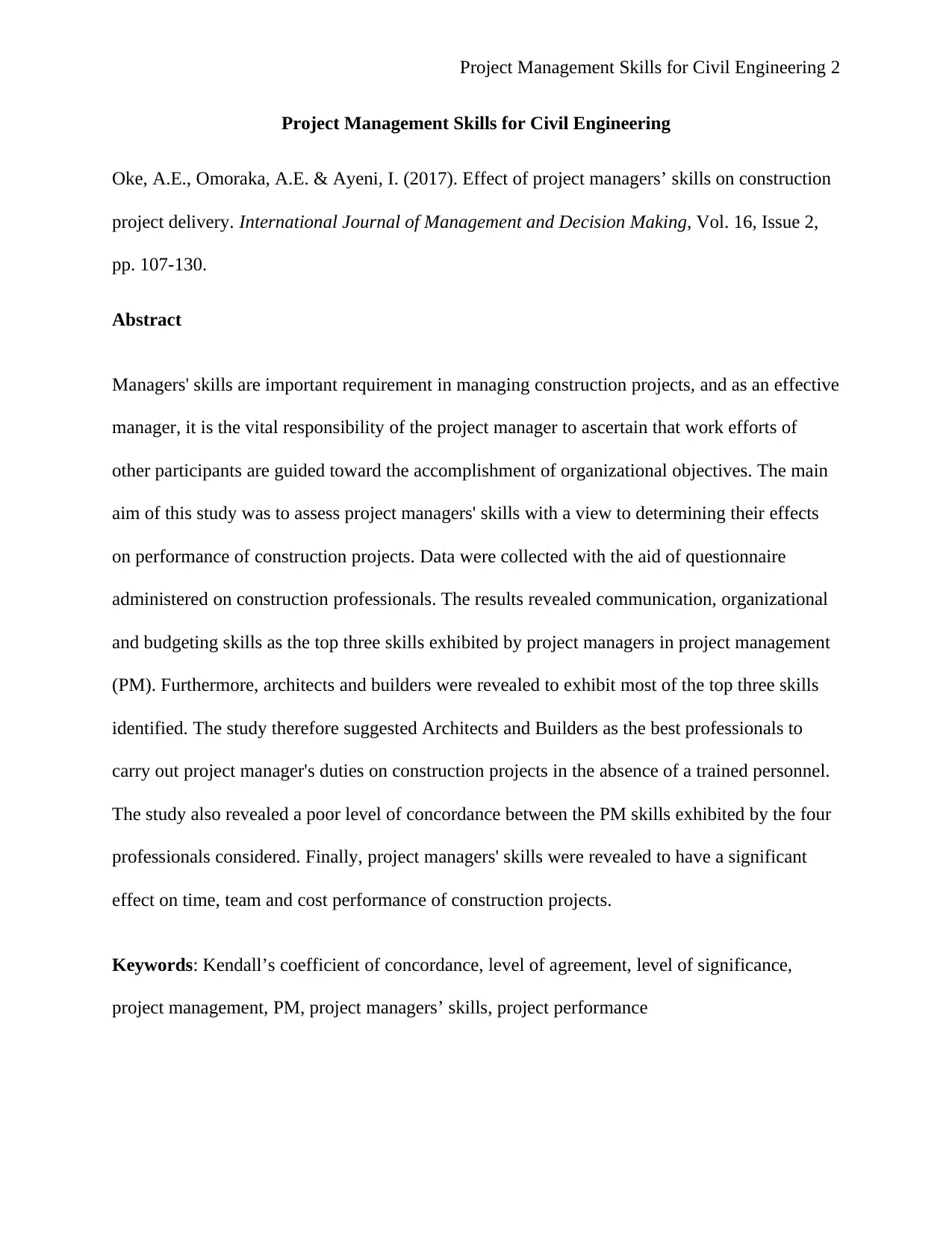
Project Management Skills for Civil Engineering 2
Project Management Skills for Civil Engineering
Oke, A.E., Omoraka, A.E. & Ayeni, I. (2017). Effect of project managers’ skills on construction
project delivery. International Journal of Management and Decision Making, Vol. 16, Issue 2,
pp. 107-130.
Abstract
Managers' skills are important requirement in managing construction projects, and as an effective
manager, it is the vital responsibility of the project manager to ascertain that work efforts of
other participants are guided toward the accomplishment of organizational objectives. The main
aim of this study was to assess project managers' skills with a view to determining their effects
on performance of construction projects. Data were collected with the aid of questionnaire
administered on construction professionals. The results revealed communication, organizational
and budgeting skills as the top three skills exhibited by project managers in project management
(PM). Furthermore, architects and builders were revealed to exhibit most of the top three skills
identified. The study therefore suggested Architects and Builders as the best professionals to
carry out project manager's duties on construction projects in the absence of a trained personnel.
The study also revealed a poor level of concordance between the PM skills exhibited by the four
professionals considered. Finally, project managers' skills were revealed to have a significant
effect on time, team and cost performance of construction projects.
Keywords: Kendall’s coefficient of concordance, level of agreement, level of significance,
project management, PM, project managers’ skills, project performance
Project Management Skills for Civil Engineering
Oke, A.E., Omoraka, A.E. & Ayeni, I. (2017). Effect of project managers’ skills on construction
project delivery. International Journal of Management and Decision Making, Vol. 16, Issue 2,
pp. 107-130.
Abstract
Managers' skills are important requirement in managing construction projects, and as an effective
manager, it is the vital responsibility of the project manager to ascertain that work efforts of
other participants are guided toward the accomplishment of organizational objectives. The main
aim of this study was to assess project managers' skills with a view to determining their effects
on performance of construction projects. Data were collected with the aid of questionnaire
administered on construction professionals. The results revealed communication, organizational
and budgeting skills as the top three skills exhibited by project managers in project management
(PM). Furthermore, architects and builders were revealed to exhibit most of the top three skills
identified. The study therefore suggested Architects and Builders as the best professionals to
carry out project manager's duties on construction projects in the absence of a trained personnel.
The study also revealed a poor level of concordance between the PM skills exhibited by the four
professionals considered. Finally, project managers' skills were revealed to have a significant
effect on time, team and cost performance of construction projects.
Keywords: Kendall’s coefficient of concordance, level of agreement, level of significance,
project management, PM, project managers’ skills, project performance
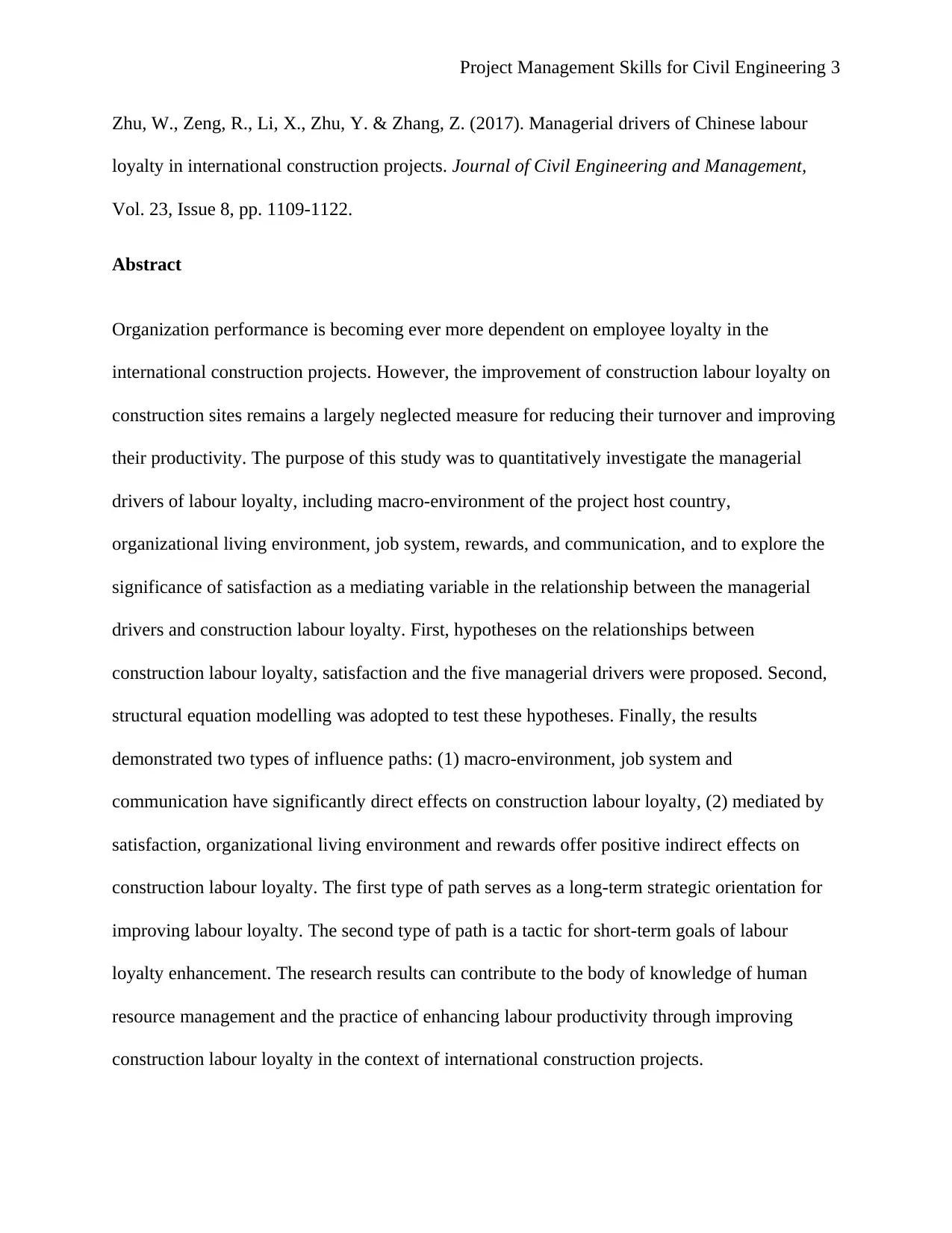
Project Management Skills for Civil Engineering 3
Zhu, W., Zeng, R., Li, X., Zhu, Y. & Zhang, Z. (2017). Managerial drivers of Chinese labour
loyalty in international construction projects. Journal of Civil Engineering and Management,
Vol. 23, Issue 8, pp. 1109-1122.
Abstract
Organization performance is becoming ever more dependent on employee loyalty in the
international construction projects. However, the improvement of construction labour loyalty on
construction sites remains a largely neglected measure for reducing their turnover and improving
their productivity. The purpose of this study was to quantitatively investigate the managerial
drivers of labour loyalty, including macro-environment of the project host country,
organizational living environment, job system, rewards, and communication, and to explore the
significance of satisfaction as a mediating variable in the relationship between the managerial
drivers and construction labour loyalty. First, hypotheses on the relationships between
construction labour loyalty, satisfaction and the five managerial drivers were proposed. Second,
structural equation modelling was adopted to test these hypotheses. Finally, the results
demonstrated two types of influence paths: (1) macro-environment, job system and
communication have significantly direct effects on construction labour loyalty, (2) mediated by
satisfaction, organizational living environment and rewards offer positive indirect effects on
construction labour loyalty. The first type of path serves as a long-term strategic orientation for
improving labour loyalty. The second type of path is a tactic for short-term goals of labour
loyalty enhancement. The research results can contribute to the body of knowledge of human
resource management and the practice of enhancing labour productivity through improving
construction labour loyalty in the context of international construction projects.
Zhu, W., Zeng, R., Li, X., Zhu, Y. & Zhang, Z. (2017). Managerial drivers of Chinese labour
loyalty in international construction projects. Journal of Civil Engineering and Management,
Vol. 23, Issue 8, pp. 1109-1122.
Abstract
Organization performance is becoming ever more dependent on employee loyalty in the
international construction projects. However, the improvement of construction labour loyalty on
construction sites remains a largely neglected measure for reducing their turnover and improving
their productivity. The purpose of this study was to quantitatively investigate the managerial
drivers of labour loyalty, including macro-environment of the project host country,
organizational living environment, job system, rewards, and communication, and to explore the
significance of satisfaction as a mediating variable in the relationship between the managerial
drivers and construction labour loyalty. First, hypotheses on the relationships between
construction labour loyalty, satisfaction and the five managerial drivers were proposed. Second,
structural equation modelling was adopted to test these hypotheses. Finally, the results
demonstrated two types of influence paths: (1) macro-environment, job system and
communication have significantly direct effects on construction labour loyalty, (2) mediated by
satisfaction, organizational living environment and rewards offer positive indirect effects on
construction labour loyalty. The first type of path serves as a long-term strategic orientation for
improving labour loyalty. The second type of path is a tactic for short-term goals of labour
loyalty enhancement. The research results can contribute to the body of knowledge of human
resource management and the practice of enhancing labour productivity through improving
construction labour loyalty in the context of international construction projects.
⊘ This is a preview!⊘
Do you want full access?
Subscribe today to unlock all pages.

Trusted by 1+ million students worldwide
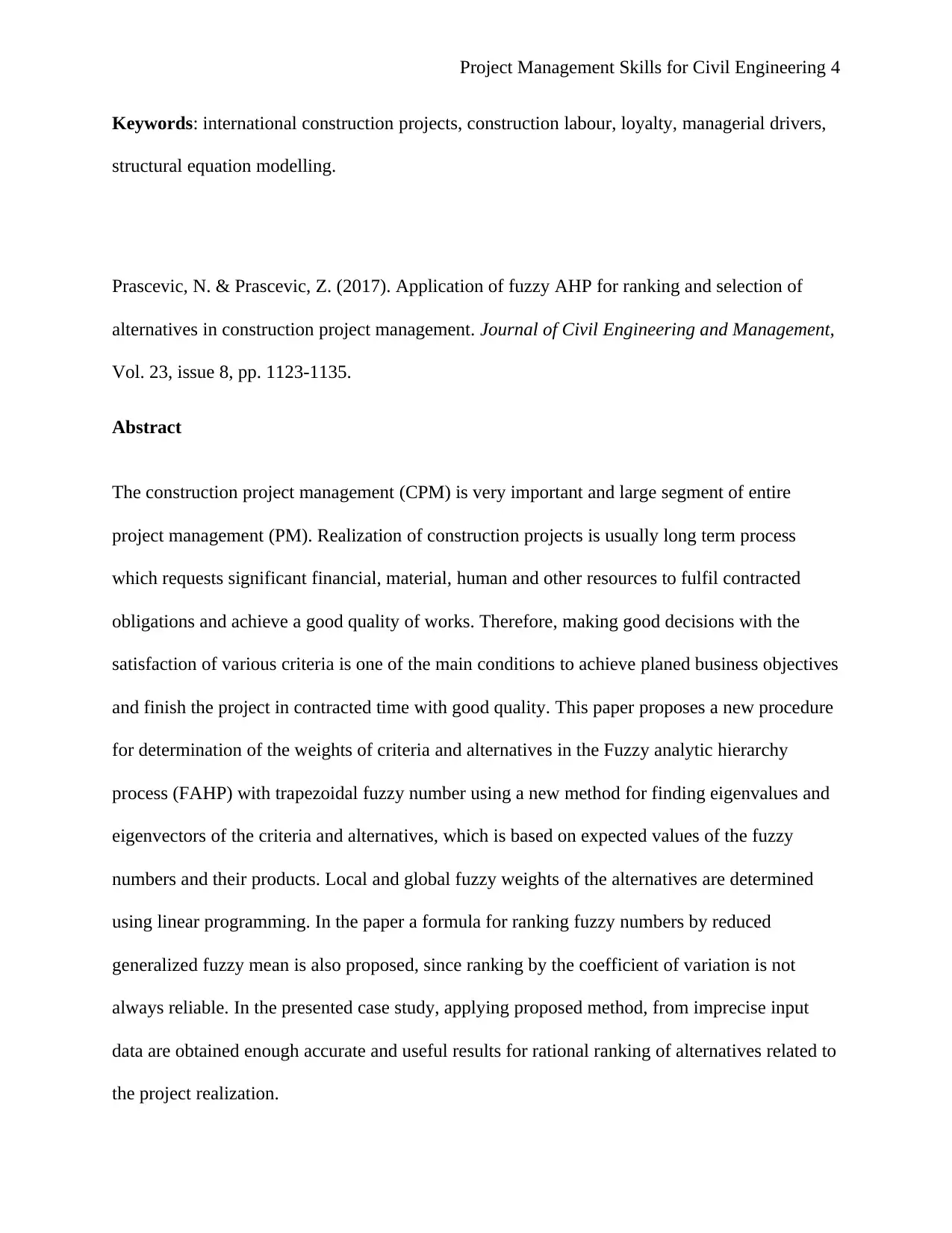
Project Management Skills for Civil Engineering 4
Keywords: international construction projects, construction labour, loyalty, managerial drivers,
structural equation modelling.
Prascevic, N. & Prascevic, Z. (2017). Application of fuzzy AHP for ranking and selection of
alternatives in construction project management. Journal of Civil Engineering and Management,
Vol. 23, issue 8, pp. 1123-1135.
Abstract
The construction project management (CPM) is very important and large segment of entire
project management (PM). Realization of construction projects is usually long term process
which requests significant financial, material, human and other resources to fulfil contracted
obligations and achieve a good quality of works. Therefore, making good decisions with the
satisfaction of various criteria is one of the main conditions to achieve planed business objectives
and finish the project in contracted time with good quality. This paper proposes a new procedure
for determination of the weights of criteria and alternatives in the Fuzzy analytic hierarchy
process (FAHP) with trapezoidal fuzzy number using a new method for finding eigenvalues and
eigenvectors of the criteria and alternatives, which is based on expected values of the fuzzy
numbers and their products. Local and global fuzzy weights of the alternatives are determined
using linear programming. In the paper a formula for ranking fuzzy numbers by reduced
generalized fuzzy mean is also proposed, since ranking by the coefficient of variation is not
always reliable. In the presented case study, applying proposed method, from imprecise input
data are obtained enough accurate and useful results for rational ranking of alternatives related to
the project realization.
Keywords: international construction projects, construction labour, loyalty, managerial drivers,
structural equation modelling.
Prascevic, N. & Prascevic, Z. (2017). Application of fuzzy AHP for ranking and selection of
alternatives in construction project management. Journal of Civil Engineering and Management,
Vol. 23, issue 8, pp. 1123-1135.
Abstract
The construction project management (CPM) is very important and large segment of entire
project management (PM). Realization of construction projects is usually long term process
which requests significant financial, material, human and other resources to fulfil contracted
obligations and achieve a good quality of works. Therefore, making good decisions with the
satisfaction of various criteria is one of the main conditions to achieve planed business objectives
and finish the project in contracted time with good quality. This paper proposes a new procedure
for determination of the weights of criteria and alternatives in the Fuzzy analytic hierarchy
process (FAHP) with trapezoidal fuzzy number using a new method for finding eigenvalues and
eigenvectors of the criteria and alternatives, which is based on expected values of the fuzzy
numbers and their products. Local and global fuzzy weights of the alternatives are determined
using linear programming. In the paper a formula for ranking fuzzy numbers by reduced
generalized fuzzy mean is also proposed, since ranking by the coefficient of variation is not
always reliable. In the presented case study, applying proposed method, from imprecise input
data are obtained enough accurate and useful results for rational ranking of alternatives related to
the project realization.
Paraphrase This Document
Need a fresh take? Get an instant paraphrase of this document with our AI Paraphraser
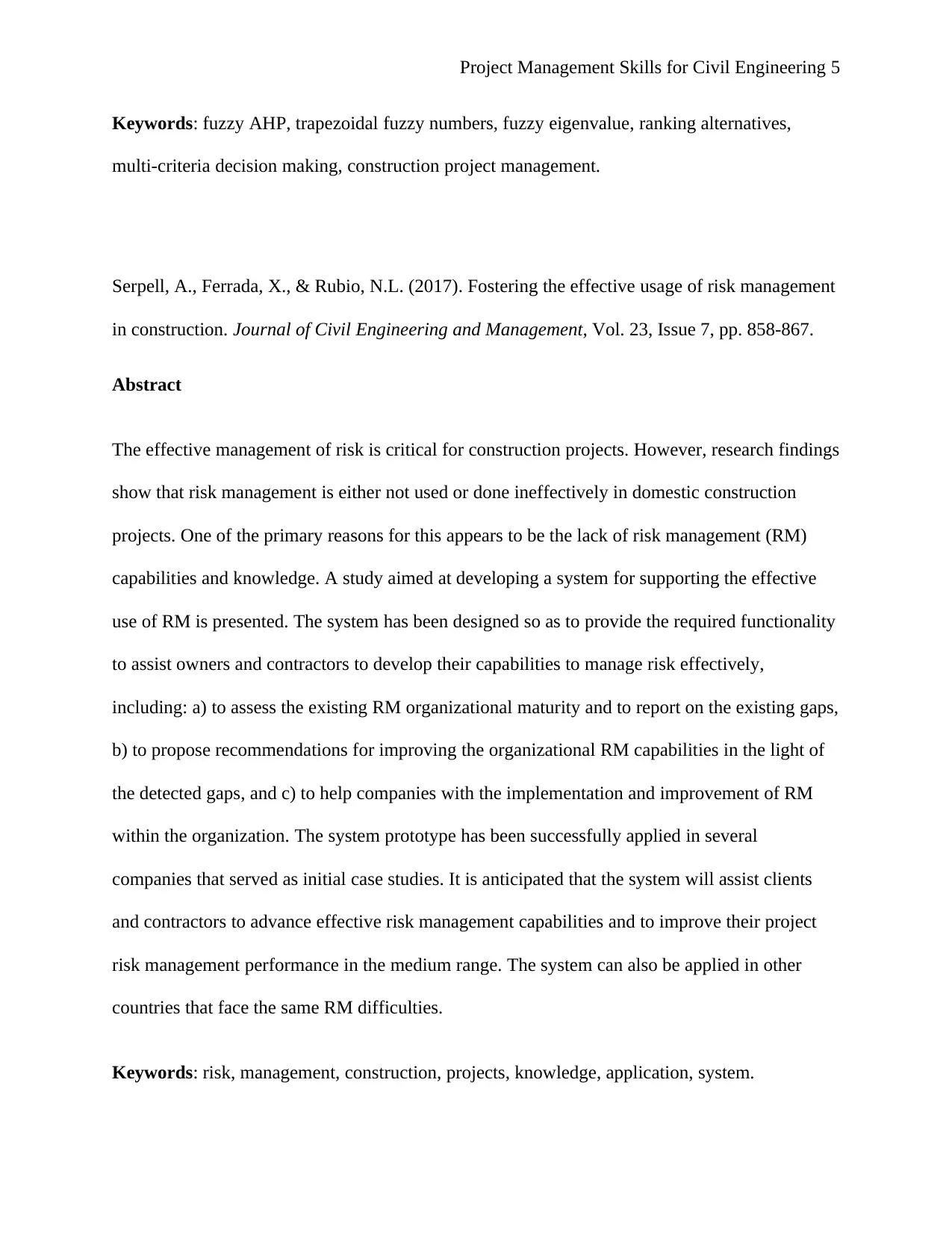
Project Management Skills for Civil Engineering 5
Keywords: fuzzy AHP, trapezoidal fuzzy numbers, fuzzy eigenvalue, ranking alternatives,
multi-criteria decision making, construction project management.
Serpell, A., Ferrada, X., & Rubio, N.L. (2017). Fostering the effective usage of risk management
in construction. Journal of Civil Engineering and Management, Vol. 23, Issue 7, pp. 858-867.
Abstract
The effective management of risk is critical for construction projects. However, research findings
show that risk management is either not used or done ineffectively in domestic construction
projects. One of the primary reasons for this appears to be the lack of risk management (RM)
capabilities and knowledge. A study aimed at developing a system for supporting the effective
use of RM is presented. The system has been designed so as to provide the required functionality
to assist owners and contractors to develop their capabilities to manage risk effectively,
including: a) to assess the existing RM organizational maturity and to report on the existing gaps,
b) to propose recommendations for improving the organizational RM capabilities in the light of
the detected gaps, and c) to help companies with the implementation and improvement of RM
within the organization. The system prototype has been successfully applied in several
companies that served as initial case studies. It is anticipated that the system will assist clients
and contractors to advance effective risk management capabilities and to improve their project
risk management performance in the medium range. The system can also be applied in other
countries that face the same RM difficulties.
Keywords: risk, management, construction, projects, knowledge, application, system.
Keywords: fuzzy AHP, trapezoidal fuzzy numbers, fuzzy eigenvalue, ranking alternatives,
multi-criteria decision making, construction project management.
Serpell, A., Ferrada, X., & Rubio, N.L. (2017). Fostering the effective usage of risk management
in construction. Journal of Civil Engineering and Management, Vol. 23, Issue 7, pp. 858-867.
Abstract
The effective management of risk is critical for construction projects. However, research findings
show that risk management is either not used or done ineffectively in domestic construction
projects. One of the primary reasons for this appears to be the lack of risk management (RM)
capabilities and knowledge. A study aimed at developing a system for supporting the effective
use of RM is presented. The system has been designed so as to provide the required functionality
to assist owners and contractors to develop their capabilities to manage risk effectively,
including: a) to assess the existing RM organizational maturity and to report on the existing gaps,
b) to propose recommendations for improving the organizational RM capabilities in the light of
the detected gaps, and c) to help companies with the implementation and improvement of RM
within the organization. The system prototype has been successfully applied in several
companies that served as initial case studies. It is anticipated that the system will assist clients
and contractors to advance effective risk management capabilities and to improve their project
risk management performance in the medium range. The system can also be applied in other
countries that face the same RM difficulties.
Keywords: risk, management, construction, projects, knowledge, application, system.
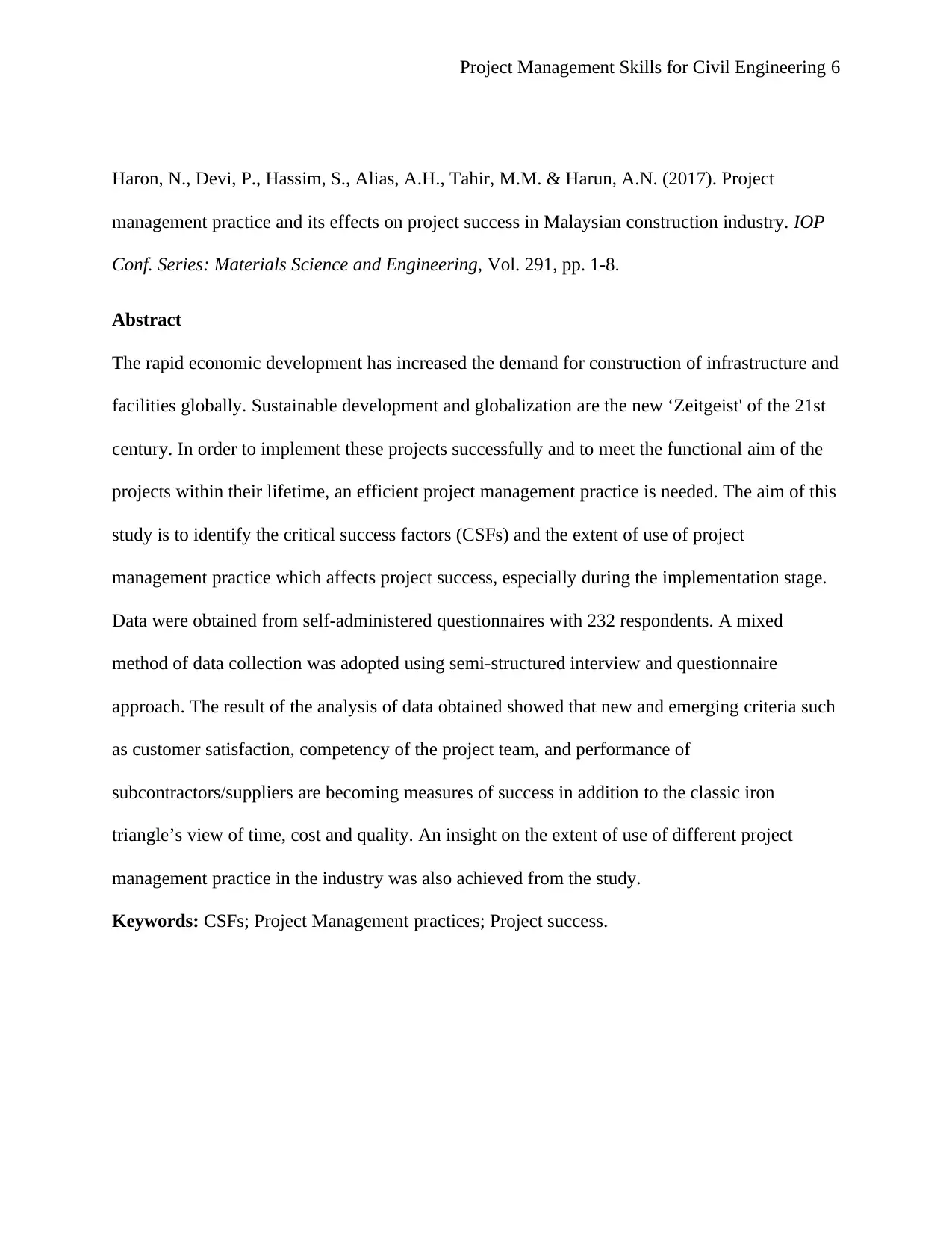
Project Management Skills for Civil Engineering 6
Haron, N., Devi, P., Hassim, S., Alias, A.H., Tahir, M.M. & Harun, A.N. (2017). Project
management practice and its effects on project success in Malaysian construction industry. IOP
Conf. Series: Materials Science and Engineering, Vol. 291, pp. 1-8.
Abstract
The rapid economic development has increased the demand for construction of infrastructure and
facilities globally. Sustainable development and globalization are the new ‘Zeitgeist' of the 21st
century. In order to implement these projects successfully and to meet the functional aim of the
projects within their lifetime, an efficient project management practice is needed. The aim of this
study is to identify the critical success factors (CSFs) and the extent of use of project
management practice which affects project success, especially during the implementation stage.
Data were obtained from self-administered questionnaires with 232 respondents. A mixed
method of data collection was adopted using semi-structured interview and questionnaire
approach. The result of the analysis of data obtained showed that new and emerging criteria such
as customer satisfaction, competency of the project team, and performance of
subcontractors/suppliers are becoming measures of success in addition to the classic iron
triangle’s view of time, cost and quality. An insight on the extent of use of different project
management practice in the industry was also achieved from the study.
Keywords: CSFs; Project Management practices; Project success.
Haron, N., Devi, P., Hassim, S., Alias, A.H., Tahir, M.M. & Harun, A.N. (2017). Project
management practice and its effects on project success in Malaysian construction industry. IOP
Conf. Series: Materials Science and Engineering, Vol. 291, pp. 1-8.
Abstract
The rapid economic development has increased the demand for construction of infrastructure and
facilities globally. Sustainable development and globalization are the new ‘Zeitgeist' of the 21st
century. In order to implement these projects successfully and to meet the functional aim of the
projects within their lifetime, an efficient project management practice is needed. The aim of this
study is to identify the critical success factors (CSFs) and the extent of use of project
management practice which affects project success, especially during the implementation stage.
Data were obtained from self-administered questionnaires with 232 respondents. A mixed
method of data collection was adopted using semi-structured interview and questionnaire
approach. The result of the analysis of data obtained showed that new and emerging criteria such
as customer satisfaction, competency of the project team, and performance of
subcontractors/suppliers are becoming measures of success in addition to the classic iron
triangle’s view of time, cost and quality. An insight on the extent of use of different project
management practice in the industry was also achieved from the study.
Keywords: CSFs; Project Management practices; Project success.
⊘ This is a preview!⊘
Do you want full access?
Subscribe today to unlock all pages.

Trusted by 1+ million students worldwide
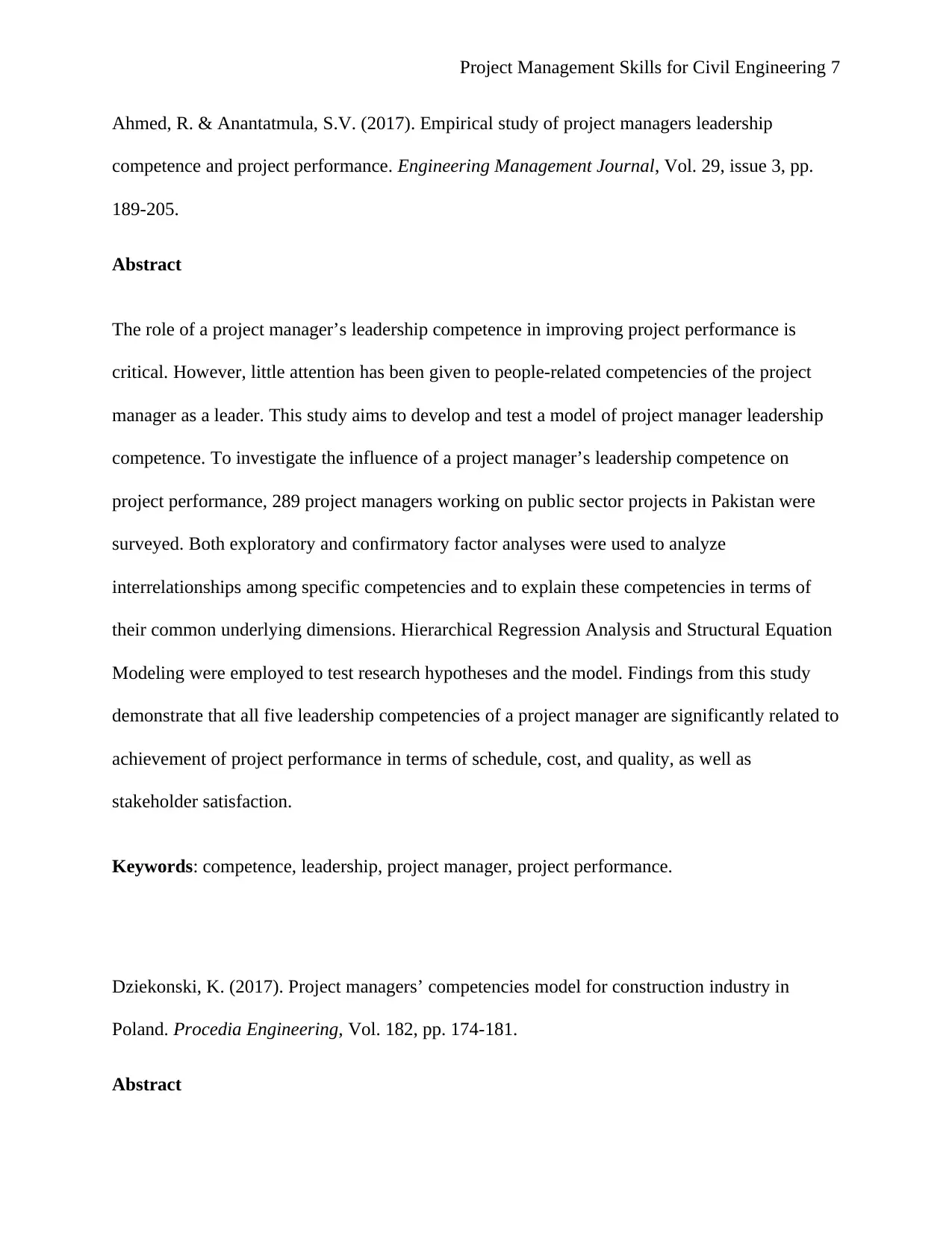
Project Management Skills for Civil Engineering 7
Ahmed, R. & Anantatmula, S.V. (2017). Empirical study of project managers leadership
competence and project performance. Engineering Management Journal, Vol. 29, issue 3, pp.
189-205.
Abstract
The role of a project manager’s leadership competence in improving project performance is
critical. However, little attention has been given to people-related competencies of the project
manager as a leader. This study aims to develop and test a model of project manager leadership
competence. To investigate the influence of a project manager’s leadership competence on
project performance, 289 project managers working on public sector projects in Pakistan were
surveyed. Both exploratory and confirmatory factor analyses were used to analyze
interrelationships among specific competencies and to explain these competencies in terms of
their common underlying dimensions. Hierarchical Regression Analysis and Structural Equation
Modeling were employed to test research hypotheses and the model. Findings from this study
demonstrate that all five leadership competencies of a project manager are significantly related to
achievement of project performance in terms of schedule, cost, and quality, as well as
stakeholder satisfaction.
Keywords: competence, leadership, project manager, project performance.
Dziekonski, K. (2017). Project managers’ competencies model for construction industry in
Poland. Procedia Engineering, Vol. 182, pp. 174-181.
Abstract
Ahmed, R. & Anantatmula, S.V. (2017). Empirical study of project managers leadership
competence and project performance. Engineering Management Journal, Vol. 29, issue 3, pp.
189-205.
Abstract
The role of a project manager’s leadership competence in improving project performance is
critical. However, little attention has been given to people-related competencies of the project
manager as a leader. This study aims to develop and test a model of project manager leadership
competence. To investigate the influence of a project manager’s leadership competence on
project performance, 289 project managers working on public sector projects in Pakistan were
surveyed. Both exploratory and confirmatory factor analyses were used to analyze
interrelationships among specific competencies and to explain these competencies in terms of
their common underlying dimensions. Hierarchical Regression Analysis and Structural Equation
Modeling were employed to test research hypotheses and the model. Findings from this study
demonstrate that all five leadership competencies of a project manager are significantly related to
achievement of project performance in terms of schedule, cost, and quality, as well as
stakeholder satisfaction.
Keywords: competence, leadership, project manager, project performance.
Dziekonski, K. (2017). Project managers’ competencies model for construction industry in
Poland. Procedia Engineering, Vol. 182, pp. 174-181.
Abstract
Paraphrase This Document
Need a fresh take? Get an instant paraphrase of this document with our AI Paraphraser
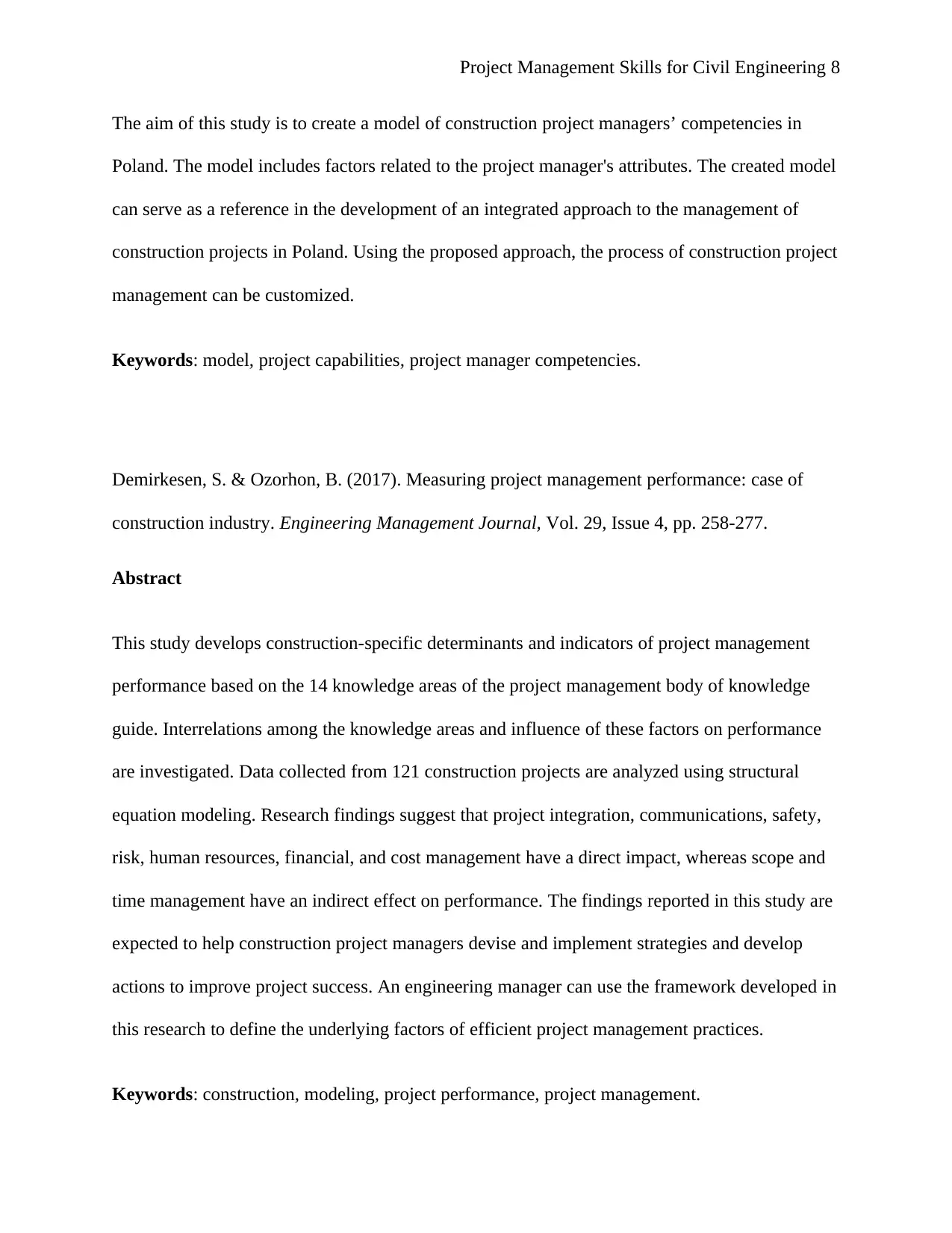
Project Management Skills for Civil Engineering 8
The aim of this study is to create a model of construction project managers’ competencies in
Poland. The model includes factors related to the project manager's attributes. The created model
can serve as a reference in the development of an integrated approach to the management of
construction projects in Poland. Using the proposed approach, the process of construction project
management can be customized.
Keywords: model, project capabilities, project manager competencies.
Demirkesen, S. & Ozorhon, B. (2017). Measuring project management performance: case of
construction industry. Engineering Management Journal, Vol. 29, Issue 4, pp. 258-277.
Abstract
This study develops construction-specific determinants and indicators of project management
performance based on the 14 knowledge areas of the project management body of knowledge
guide. Interrelations among the knowledge areas and influence of these factors on performance
are investigated. Data collected from 121 construction projects are analyzed using structural
equation modeling. Research findings suggest that project integration, communications, safety,
risk, human resources, financial, and cost management have a direct impact, whereas scope and
time management have an indirect effect on performance. The findings reported in this study are
expected to help construction project managers devise and implement strategies and develop
actions to improve project success. An engineering manager can use the framework developed in
this research to define the underlying factors of efficient project management practices.
Keywords: construction, modeling, project performance, project management.
The aim of this study is to create a model of construction project managers’ competencies in
Poland. The model includes factors related to the project manager's attributes. The created model
can serve as a reference in the development of an integrated approach to the management of
construction projects in Poland. Using the proposed approach, the process of construction project
management can be customized.
Keywords: model, project capabilities, project manager competencies.
Demirkesen, S. & Ozorhon, B. (2017). Measuring project management performance: case of
construction industry. Engineering Management Journal, Vol. 29, Issue 4, pp. 258-277.
Abstract
This study develops construction-specific determinants and indicators of project management
performance based on the 14 knowledge areas of the project management body of knowledge
guide. Interrelations among the knowledge areas and influence of these factors on performance
are investigated. Data collected from 121 construction projects are analyzed using structural
equation modeling. Research findings suggest that project integration, communications, safety,
risk, human resources, financial, and cost management have a direct impact, whereas scope and
time management have an indirect effect on performance. The findings reported in this study are
expected to help construction project managers devise and implement strategies and develop
actions to improve project success. An engineering manager can use the framework developed in
this research to define the underlying factors of efficient project management practices.
Keywords: construction, modeling, project performance, project management.
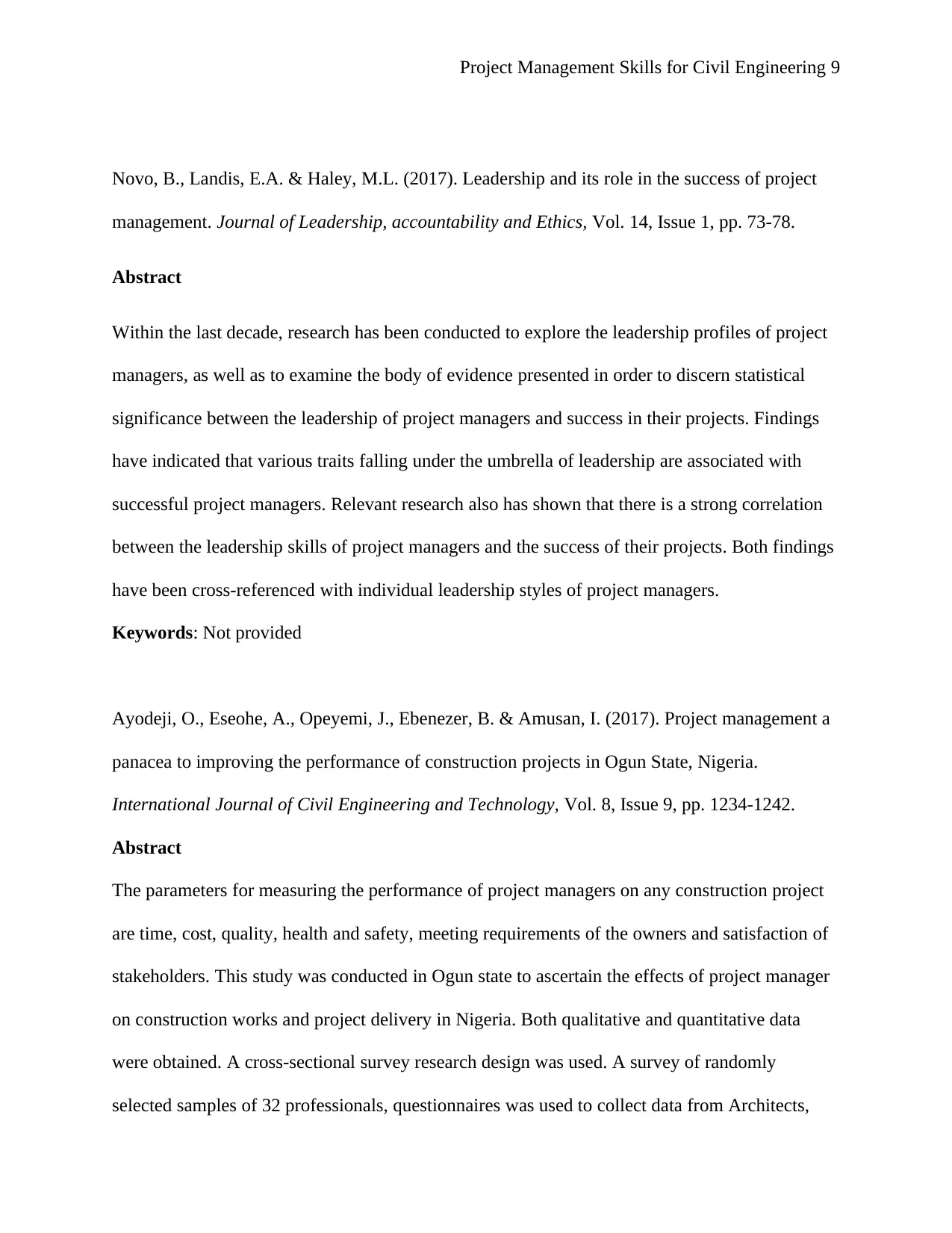
Project Management Skills for Civil Engineering 9
Novo, B., Landis, E.A. & Haley, M.L. (2017). Leadership and its role in the success of project
management. Journal of Leadership, accountability and Ethics, Vol. 14, Issue 1, pp. 73-78.
Abstract
Within the last decade, research has been conducted to explore the leadership profiles of project
managers, as well as to examine the body of evidence presented in order to discern statistical
significance between the leadership of project managers and success in their projects. Findings
have indicated that various traits falling under the umbrella of leadership are associated with
successful project managers. Relevant research also has shown that there is a strong correlation
between the leadership skills of project managers and the success of their projects. Both findings
have been cross-referenced with individual leadership styles of project managers.
Keywords: Not provided
Ayodeji, O., Eseohe, A., Opeyemi, J., Ebenezer, B. & Amusan, I. (2017). Project management a
panacea to improving the performance of construction projects in Ogun State, Nigeria.
International Journal of Civil Engineering and Technology, Vol. 8, Issue 9, pp. 1234-1242.
Abstract
The parameters for measuring the performance of project managers on any construction project
are time, cost, quality, health and safety, meeting requirements of the owners and satisfaction of
stakeholders. This study was conducted in Ogun state to ascertain the effects of project manager
on construction works and project delivery in Nigeria. Both qualitative and quantitative data
were obtained. A cross-sectional survey research design was used. A survey of randomly
selected samples of 32 professionals, questionnaires was used to collect data from Architects,
Novo, B., Landis, E.A. & Haley, M.L. (2017). Leadership and its role in the success of project
management. Journal of Leadership, accountability and Ethics, Vol. 14, Issue 1, pp. 73-78.
Abstract
Within the last decade, research has been conducted to explore the leadership profiles of project
managers, as well as to examine the body of evidence presented in order to discern statistical
significance between the leadership of project managers and success in their projects. Findings
have indicated that various traits falling under the umbrella of leadership are associated with
successful project managers. Relevant research also has shown that there is a strong correlation
between the leadership skills of project managers and the success of their projects. Both findings
have been cross-referenced with individual leadership styles of project managers.
Keywords: Not provided
Ayodeji, O., Eseohe, A., Opeyemi, J., Ebenezer, B. & Amusan, I. (2017). Project management a
panacea to improving the performance of construction projects in Ogun State, Nigeria.
International Journal of Civil Engineering and Technology, Vol. 8, Issue 9, pp. 1234-1242.
Abstract
The parameters for measuring the performance of project managers on any construction project
are time, cost, quality, health and safety, meeting requirements of the owners and satisfaction of
stakeholders. This study was conducted in Ogun state to ascertain the effects of project manager
on construction works and project delivery in Nigeria. Both qualitative and quantitative data
were obtained. A cross-sectional survey research design was used. A survey of randomly
selected samples of 32 professionals, questionnaires was used to collect data from Architects,
⊘ This is a preview!⊘
Do you want full access?
Subscribe today to unlock all pages.

Trusted by 1+ million students worldwide
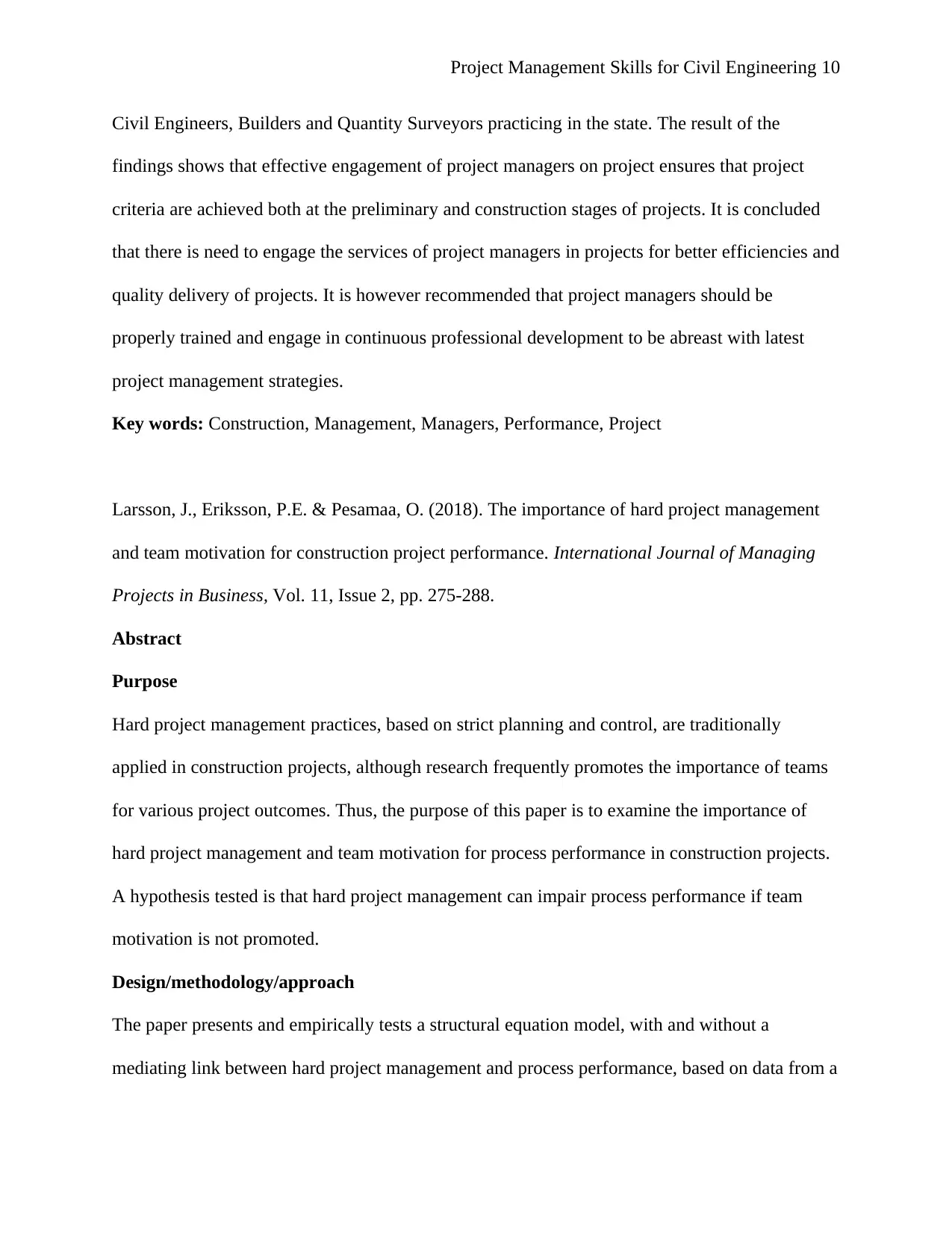
Project Management Skills for Civil Engineering 10
Civil Engineers, Builders and Quantity Surveyors practicing in the state. The result of the
findings shows that effective engagement of project managers on project ensures that project
criteria are achieved both at the preliminary and construction stages of projects. It is concluded
that there is need to engage the services of project managers in projects for better efficiencies and
quality delivery of projects. It is however recommended that project managers should be
properly trained and engage in continuous professional development to be abreast with latest
project management strategies.
Key words: Construction, Management, Managers, Performance, Project
Larsson, J., Eriksson, P.E. & Pesamaa, O. (2018). The importance of hard project management
and team motivation for construction project performance. International Journal of Managing
Projects in Business, Vol. 11, Issue 2, pp. 275-288.
Abstract
Purpose
Hard project management practices, based on strict planning and control, are traditionally
applied in construction projects, although research frequently promotes the importance of teams
for various project outcomes. Thus, the purpose of this paper is to examine the importance of
hard project management and team motivation for process performance in construction projects.
A hypothesis tested is that hard project management can impair process performance if team
motivation is not promoted.
Design/methodology/approach
The paper presents and empirically tests a structural equation model, with and without a
mediating link between hard project management and process performance, based on data from a
Civil Engineers, Builders and Quantity Surveyors practicing in the state. The result of the
findings shows that effective engagement of project managers on project ensures that project
criteria are achieved both at the preliminary and construction stages of projects. It is concluded
that there is need to engage the services of project managers in projects for better efficiencies and
quality delivery of projects. It is however recommended that project managers should be
properly trained and engage in continuous professional development to be abreast with latest
project management strategies.
Key words: Construction, Management, Managers, Performance, Project
Larsson, J., Eriksson, P.E. & Pesamaa, O. (2018). The importance of hard project management
and team motivation for construction project performance. International Journal of Managing
Projects in Business, Vol. 11, Issue 2, pp. 275-288.
Abstract
Purpose
Hard project management practices, based on strict planning and control, are traditionally
applied in construction projects, although research frequently promotes the importance of teams
for various project outcomes. Thus, the purpose of this paper is to examine the importance of
hard project management and team motivation for process performance in construction projects.
A hypothesis tested is that hard project management can impair process performance if team
motivation is not promoted.
Design/methodology/approach
The paper presents and empirically tests a structural equation model, with and without a
mediating link between hard project management and process performance, based on data from a
Paraphrase This Document
Need a fresh take? Get an instant paraphrase of this document with our AI Paraphraser
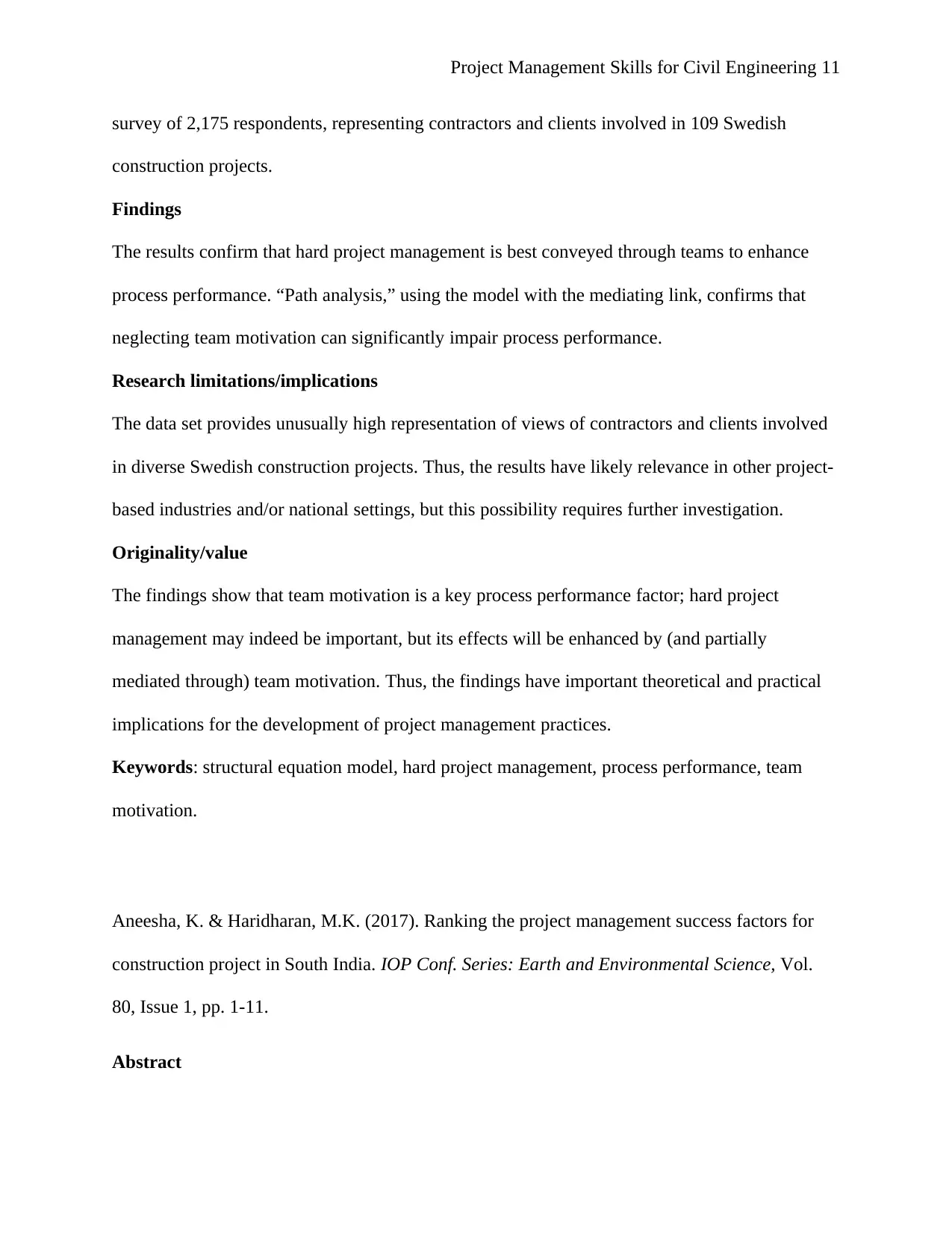
Project Management Skills for Civil Engineering 11
survey of 2,175 respondents, representing contractors and clients involved in 109 Swedish
construction projects.
Findings
The results confirm that hard project management is best conveyed through teams to enhance
process performance. “Path analysis,” using the model with the mediating link, confirms that
neglecting team motivation can significantly impair process performance.
Research limitations/implications
The data set provides unusually high representation of views of contractors and clients involved
in diverse Swedish construction projects. Thus, the results have likely relevance in other project-
based industries and/or national settings, but this possibility requires further investigation.
Originality/value
The findings show that team motivation is a key process performance factor; hard project
management may indeed be important, but its effects will be enhanced by (and partially
mediated through) team motivation. Thus, the findings have important theoretical and practical
implications for the development of project management practices.
Keywords: structural equation model, hard project management, process performance, team
motivation.
Aneesha, K. & Haridharan, M.K. (2017). Ranking the project management success factors for
construction project in South India. IOP Conf. Series: Earth and Environmental Science, Vol.
80, Issue 1, pp. 1-11.
Abstract
survey of 2,175 respondents, representing contractors and clients involved in 109 Swedish
construction projects.
Findings
The results confirm that hard project management is best conveyed through teams to enhance
process performance. “Path analysis,” using the model with the mediating link, confirms that
neglecting team motivation can significantly impair process performance.
Research limitations/implications
The data set provides unusually high representation of views of contractors and clients involved
in diverse Swedish construction projects. Thus, the results have likely relevance in other project-
based industries and/or national settings, but this possibility requires further investigation.
Originality/value
The findings show that team motivation is a key process performance factor; hard project
management may indeed be important, but its effects will be enhanced by (and partially
mediated through) team motivation. Thus, the findings have important theoretical and practical
implications for the development of project management practices.
Keywords: structural equation model, hard project management, process performance, team
motivation.
Aneesha, K. & Haridharan, M.K. (2017). Ranking the project management success factors for
construction project in South India. IOP Conf. Series: Earth and Environmental Science, Vol.
80, Issue 1, pp. 1-11.
Abstract
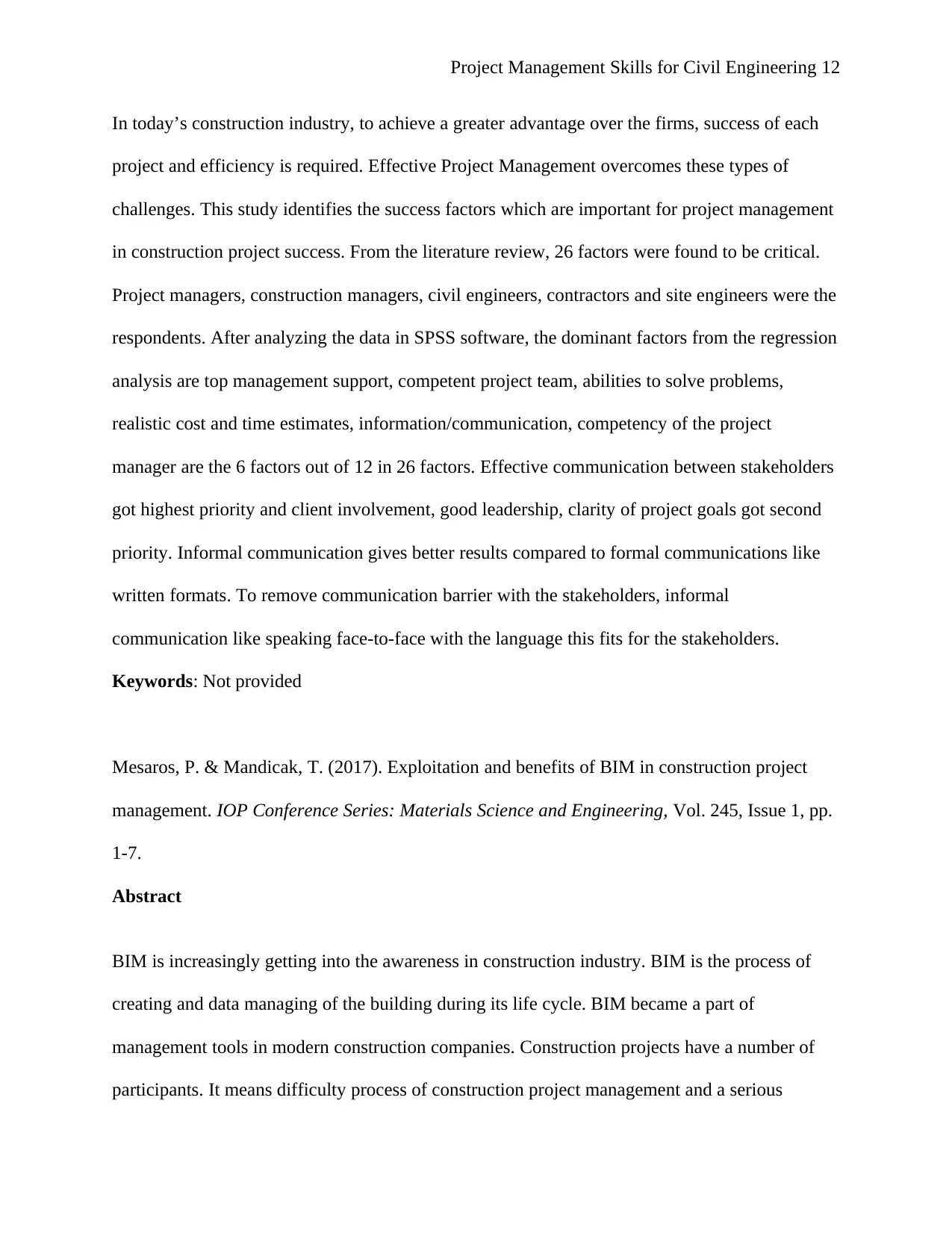
Project Management Skills for Civil Engineering 12
In today’s construction industry, to achieve a greater advantage over the firms, success of each
project and efficiency is required. Effective Project Management overcomes these types of
challenges. This study identifies the success factors which are important for project management
in construction project success. From the literature review, 26 factors were found to be critical.
Project managers, construction managers, civil engineers, contractors and site engineers were the
respondents. After analyzing the data in SPSS software, the dominant factors from the regression
analysis are top management support, competent project team, abilities to solve problems,
realistic cost and time estimates, information/communication, competency of the project
manager are the 6 factors out of 12 in 26 factors. Effective communication between stakeholders
got highest priority and client involvement, good leadership, clarity of project goals got second
priority. Informal communication gives better results compared to formal communications like
written formats. To remove communication barrier with the stakeholders, informal
communication like speaking face-to-face with the language this fits for the stakeholders.
Keywords: Not provided
Mesaros, P. & Mandicak, T. (2017). Exploitation and benefits of BIM in construction project
management. IOP Conference Series: Materials Science and Engineering, Vol. 245, Issue 1, pp.
1-7.
Abstract
BIM is increasingly getting into the awareness in construction industry. BIM is the process of
creating and data managing of the building during its life cycle. BIM became a part of
management tools in modern construction companies. Construction projects have a number of
participants. It means difficulty process of construction project management and a serious
In today’s construction industry, to achieve a greater advantage over the firms, success of each
project and efficiency is required. Effective Project Management overcomes these types of
challenges. This study identifies the success factors which are important for project management
in construction project success. From the literature review, 26 factors were found to be critical.
Project managers, construction managers, civil engineers, contractors and site engineers were the
respondents. After analyzing the data in SPSS software, the dominant factors from the regression
analysis are top management support, competent project team, abilities to solve problems,
realistic cost and time estimates, information/communication, competency of the project
manager are the 6 factors out of 12 in 26 factors. Effective communication between stakeholders
got highest priority and client involvement, good leadership, clarity of project goals got second
priority. Informal communication gives better results compared to formal communications like
written formats. To remove communication barrier with the stakeholders, informal
communication like speaking face-to-face with the language this fits for the stakeholders.
Keywords: Not provided
Mesaros, P. & Mandicak, T. (2017). Exploitation and benefits of BIM in construction project
management. IOP Conference Series: Materials Science and Engineering, Vol. 245, Issue 1, pp.
1-7.
Abstract
BIM is increasingly getting into the awareness in construction industry. BIM is the process of
creating and data managing of the building during its life cycle. BIM became a part of
management tools in modern construction companies. Construction projects have a number of
participants. It means difficulty process of construction project management and a serious
⊘ This is a preview!⊘
Do you want full access?
Subscribe today to unlock all pages.

Trusted by 1+ million students worldwide
1 out of 15
Your All-in-One AI-Powered Toolkit for Academic Success.
+13062052269
info@desklib.com
Available 24*7 on WhatsApp / Email
![[object Object]](/_next/static/media/star-bottom.7253800d.svg)
Unlock your academic potential
Copyright © 2020–2026 A2Z Services. All Rights Reserved. Developed and managed by ZUCOL.
